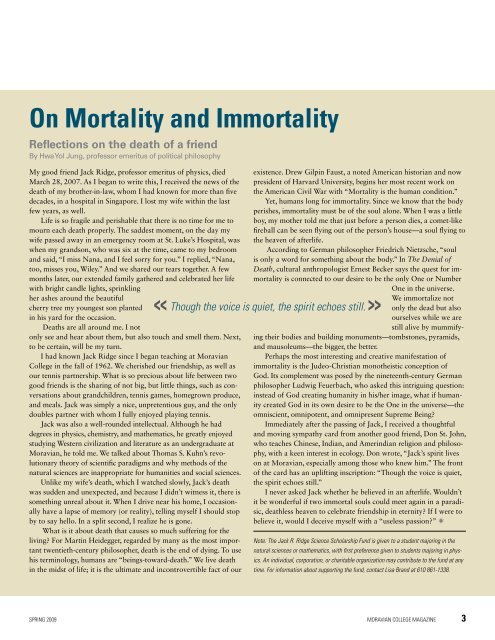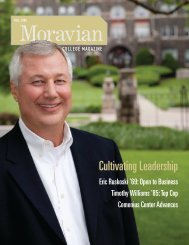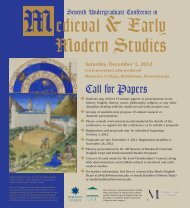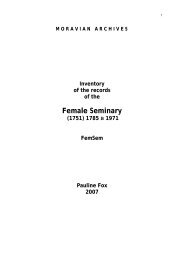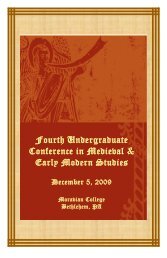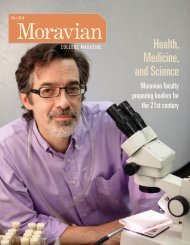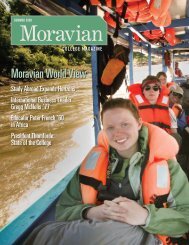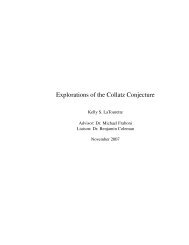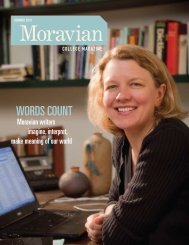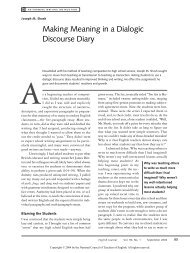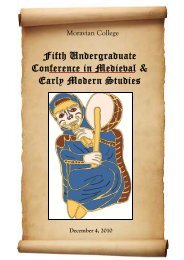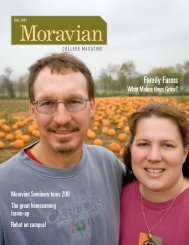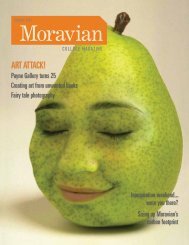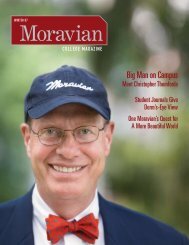Ahead of the Curve - Moravian College
Ahead of the Curve - Moravian College
Ahead of the Curve - Moravian College
You also want an ePaper? Increase the reach of your titles
YUMPU automatically turns print PDFs into web optimized ePapers that Google loves.
On Mortality and Immortality<br />
Reflections on <strong>the</strong> death <strong>of</strong> a friend<br />
By Hwa Yol Jung, pr<strong>of</strong>essor emeritus <strong>of</strong> political philosophy<br />
My good friend Jack Ridge, pr<strong>of</strong>essor emeritus <strong>of</strong> physics, died<br />
March 28, 2007. As I began to write this, I received <strong>the</strong> news <strong>of</strong> <strong>the</strong><br />
death <strong>of</strong> my bro<strong>the</strong>r-in-law, whom I had known for more than five<br />
decades, in a hospital in Singapore. I lost my wife within <strong>the</strong> last<br />
few years, as well.<br />
Life is so fragile and perishable that <strong>the</strong>re is no time for me to<br />
mourn each death properly. The saddest moment, on <strong>the</strong> day my<br />
wife passed away in an emergency room at St. Luke’s Hospital, was<br />
when my grandson, who was six at <strong>the</strong> time, came to my bedroom<br />
and said, “I miss Nana, and I feel sorry for you.” I replied, “Nana,<br />
too, misses you, Wiley.” And we shared our tears toge<strong>the</strong>r. A few<br />
months later, our extended family ga<strong>the</strong>red and celebrated her life<br />
with bright candle lights, sprinkling<br />
her ashes around <strong>the</strong> beautiful<br />
cherry tree my youngest son planted<br />
in his yard for <strong>the</strong> occasion.<br />
Deaths are all around me. I not<br />
only see and hear about <strong>the</strong>m, but also touch and smell <strong>the</strong>m. Next,<br />
to be certain, will be my turn.<br />
I had known Jack Ridge since I began teaching at <strong>Moravian</strong><br />
<strong>College</strong> in <strong>the</strong> fall <strong>of</strong> 1962. We cherished our friendship, as well as<br />
our tennis partnership. What is so precious about life between two<br />
good friends is <strong>the</strong> sharing <strong>of</strong> not big, but little things, such as conversations<br />
about grandchildren, tennis games, homegrown produce,<br />
and meals. Jack was simply a nice, unpretentious guy, and <strong>the</strong> only<br />
doubles partner with whom I fully enjoyed playing tennis.<br />
Jack was also a well-rounded intellectual. Although he had<br />
degrees in physics, chemistry, and ma<strong>the</strong>matics, he greatly enjoyed<br />
studying Western civilization and literature as an undergraduate at<br />
<strong>Moravian</strong>, he told me. We talked about Thomas S. Kuhn’s revolutionary<br />
<strong>the</strong>ory <strong>of</strong> scientific paradigms and why methods <strong>of</strong> <strong>the</strong><br />
natural sciences are inappropriate for humanities and social sciences.<br />
Unlike my wife’s death, which I watched slowly, Jack’s death<br />
was sudden and unexpected, and because I didn’t witness it, <strong>the</strong>re is<br />
something unreal about it. When I drive near his home, I occasionally<br />
have a lapse <strong>of</strong> memory (or reality), telling myself I should stop<br />
by to say hello. In a split second, I realize he is gone.<br />
What is it about death that causes so much suffering for <strong>the</strong><br />
living For Martin Heidegger, regarded by many as <strong>the</strong> most important<br />
twentieth-century philosopher, death is <strong>the</strong> end <strong>of</strong> dying. To use<br />
his terminology, humans are “beings-toward-death.” We live death<br />
in <strong>the</strong> midst <strong>of</strong> life; it is <strong>the</strong> ultimate and incontrovertible fact <strong>of</strong> our<br />
existence. Drew Gilpin Faust, a noted American historian and now<br />
president <strong>of</strong> Harvard University, begins her most recent work on<br />
<strong>the</strong> American Civil War with “Mortality is <strong>the</strong> human condition.”<br />
Yet, humans long for immortality. Since we know that <strong>the</strong> body<br />
perishes, immortality must be <strong>of</strong> <strong>the</strong> soul alone. When I was a little<br />
boy, my mo<strong>the</strong>r told me that just before a person dies, a comet-like<br />
fireball can be seen flying out <strong>of</strong> <strong>the</strong> person’s house—a soul flying to<br />
<strong>the</strong> heaven <strong>of</strong> afterlife.<br />
According to German philosopher Friedrich Nietzsche, “soul<br />
is only a word for something about <strong>the</strong> body.” In The Denial <strong>of</strong><br />
Death, cultural anthropologist Ernest Becker says <strong>the</strong> quest for immortality<br />
is connected to our desire to be <strong>the</strong> only One or Number<br />
One in <strong>the</strong> universe.<br />
We immortalize not<br />
only <strong>the</strong> dead but also<br />
ourselves while we are<br />
still alive by mummifying<br />
<strong>the</strong>ir bodies and building monuments—tombstones, pyramids,<br />
and mausoleums—<strong>the</strong> bigger, <strong>the</strong> better.<br />
Perhaps <strong>the</strong> most interesting and creative manifestation <strong>of</strong><br />
immortality is <strong>the</strong> Judeo-Christian mono<strong>the</strong>istic conception <strong>of</strong><br />
God. Its complement was posed by <strong>the</strong> nineteenth-century German<br />
philosopher Ludwig Feuerbach, who asked this intriguing question:<br />
instead <strong>of</strong> God creating humanity in his/her image, what if humanity<br />
created God in its own desire to be <strong>the</strong> One in <strong>the</strong> universe—<strong>the</strong><br />
omniscient, omnipotent, and omnipresent Supreme Being<br />
Immediately after <strong>the</strong> passing <strong>of</strong> Jack, I received a thoughtful<br />
and moving sympathy card from ano<strong>the</strong>r good friend, Don St. John,<br />
who teaches Chinese, Indian, and Amerindian religion and philosophy,<br />
with a keen interest in ecology. Don wrote, “Jack’s spirit lives<br />
on at <strong>Moravian</strong>, especially among those who knew him.” The front<br />
<strong>of</strong> <strong>the</strong> card has an uplifting inscription: “Though <strong>the</strong> voice is quiet,<br />
<strong>the</strong> spirit echoes still.”<br />
I never asked Jack whe<strong>the</strong>r he believed in an afterlife. Wouldn’t<br />
it be wonderful if two immortal souls could meet again in a paradisic,<br />
deathless heaven to celebrate friendship in eternity If I were to<br />
believe it, would I deceive myself with a “useless passion” W<br />
><br />
Note: The Jack R. Ridge Science Scholarship Fund is given to a student majoring in <strong>the</strong><br />
natural sciences or ma<strong>the</strong>matics, with first preference given to students majoring in physics.<br />
An individual, corporation, or charitable organization may contribute to <strong>the</strong> fund at any<br />
time. For information about supporting <strong>the</strong> fund, contact Lisa Brand at 610 861-1338.<br />
SPRING 2009 MORAVIAN COLLEGE MAGAZINE 3


